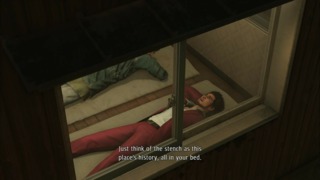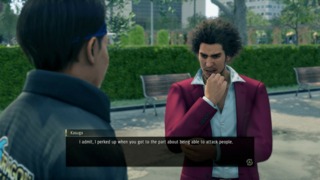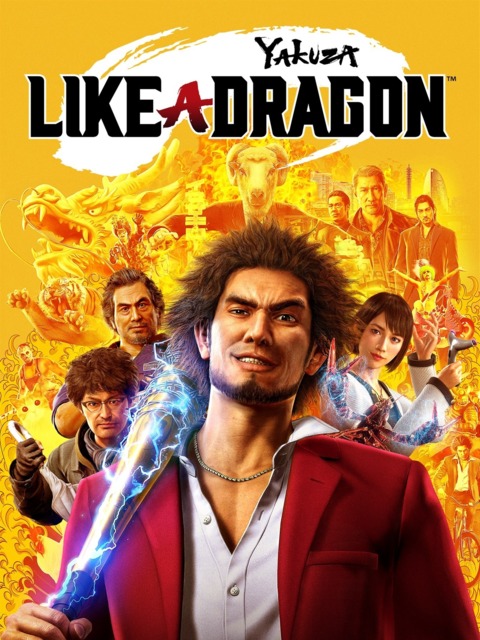Ichiban's my guy. I'm not sure he'll be yours.

Reviewed on PC, 6700k/1080. 55 hours played, main story and 90-95% of Substories complete. One alternate job leveled.
Before I get into the game itself know these things: I'm not a JRPG person though I don't dislike them, have never really been one, and am an absolute sucker for a "local bastard does good" crime story.
If you're in the same boat as me, you'll probably dig Like a Dragon. If you're a seasoned JRPG veteran, are looking for thematic consistancy, or come to Yakuza for the mini-games and side stories, I'm not sure this is a five star game for you. It might not be a four, depending on how much those two issues bother you after spending serious time with it. The building blocks for a great Yakuza story are all there. Ichiban grew on me incredibly quickly from the jump, even as a punch perm'd street paladin who's just trying to have fun with the Yakuza lifestyle. Where those familiar with Kiryu's adventures may be expecting the usual comedic beats of trepidation jumping into some bizarre scenario, Ichiban has to be chained to a wall before he would consider not diving into the quixotic opportunity of the moment. Like a Dragon's a weird name for this thing, because unless the aim is to tie such singularity to justice instead of willpower, the Kazuma Kiryu brand of macho defiance isn't ever really the goal. I got a lot out of this aspect personally, but those who enjoy a level of detachment among the stone-faced angry men will suffer a bit for it.
Having a traveling party and the smart around-town dialog choices are where the bulk of the work to make Ichijo, Sotenbori and Kamorocho feel alive and these character segments did a great deal to draw me into giving a damn about my party; instances of betrayal or revelation for the most part actually hit me, making the bond meter a little more than an on screen indicator. Even the more emotionally reserved future crew members were usually cool enough people if it didn't feel all the way deep enough to compare meaning to those by your side in hour five instead of hour thirty five.
That being said, there are parts where you can tell this is the studio's first RPG game. Attempts to balance out leveling in the open world mostly fail, and instead on three separate occasions you are presented a challenge dungeon specifically to grind and gear up. Without using them the game becomes nearly impossible to complete as you'll just be taking too much damage without the right gear and the right run of enemy attacks knocks out Ichiban, regardless of whoever's still standing. This happened to me with an Erase style one-hit KO near the end of the game in a save restricted area, and man you can have one hits or you can have a fail state based on one character but please don't give me both, that's a real heartache.

My main disappointments in the game I think could have been fixed with writing revisions and I have to wonder if the game's RPG switch did leave a few other aspects out in the cold. In the final hours of the game I kind of lost track of what the main character's motivations would actually be. One or two big bads are really nothing more than hyperviolent incels at their core, and never really offer their more dramatic teased payoffs. Series returning characters aren't nearly as impactful as you'd like them to be; they're more than checkboxes, but not the pivotal world-defining demigods they kind of justifiably are after seven games. Substory motivations repeat even in the context of this being the eighth one of these. Two of them almost share a character line with the main plot when it comes to sickness among kids. The variety suffers a bit among what's on offer, and this is my 4th Yakuza game. If this is your 8th, you might find yourself buttoning through some of this. And if you really want the English voiceover, know going in not everything is translated, like street and enemy dialog. No subs either, even though the "bubble sub" style of past Yakuza games makes appearances elsewhere within this implementation of the engine.
People with a better command of the social issues touched on have summed it up better than I have but the same emotional rollercoaster applies to the game's treatment of touchier subjects. Two female characters are available to join the band (more on the second one coming up) and while a lot of back and forth barb is more real than it is inserted, some of it left me bewildered. Saeko, your firebrand barmaid with a grudge that finds a home in friendship, isn't going to be denied entry to any spaces and carries herself accordingly, but isn't made out to be a glutton except for the areas where membership in that group would demand they be; alcohol consumption and dining experiences. But Yakuza games are stories about bars, and it's good to have a brawler as the feminine end of that. It makes the moments that reverse that character stick out even more; her unprompted crusade against gender neutral language, the game's seeming insistence you spec her into the healing, dancing, uwu idol job for a bit to keep going, how when there's other women to talk to she must be off getting a cigarette or something before reappearing in the inevitable post cutscene fight. It's a bit highlighted among anything else and a bit odd...

But, not as odd in my experience as the Ichiban Confections minigame. Basically, in order to access Eri, the game's only optional party member and also earn enough revenue to both unlock the last of the game's upgrades and pay back effeminate yet capable financier mischief maker Nick, is to take all of the nice people you have met in the substories, all of the hearts you've touched, all of the generosity you can offer to a homeless camp and crush it all under the heels of market efficiencies. It's a cold blooded corporate sim, chiefly about paying people just enough not to leave and bumping up your stock price so that you can take home a bigger share of the pie in your own wallet. Is there some satire to it? Yeah. Is it fun to do at all, if you're more invested in the people-driven minigames of past Yakuza experiences like I happen to be? Not in the slightest! I haven't gotten through it. I've never gotten Eri, who seems locked into the corporate PA persona based on how far I was willing to stomach. I wonder if the Clerk job is any good. I don't know, because it's not fun or really rewarding to get there, regardless of how many comedy office chickens you bring into the equation. It doesn't take long to get through the bare minimum and I still couldn't muster up the effort.
Even with the blemishes inherent from the gear shift to RPG combat there's a lot here for me specifically to like. The main plotline even with its shaky turns had its hook in me and had me personally invested. The character moments from having a party around sell SOME interpersonal dialog at high water marks for the series. As someone who last played JRPG's with any regularity over a decade ago, it sure seems modern and refined to me, but if you've stayed with the genre you will probably disagree. The animation work in a lot of the game is outstanding and emotive continuing to push to the studio's strengths. I had a great time. It's a four for me. I love Ichiban. Nanba forever. Adachi got fired so he's not ACAB anymore. Saeko's the realest. If all of this washes right over you, though, or one of these other flaws hits you harder? I can see how this could be a game a lot of players don't see through to conclusion at all. Haven't played a JRPG in ages and like some gangster shit? I think you're the market here, and for that market, you're very well served.
